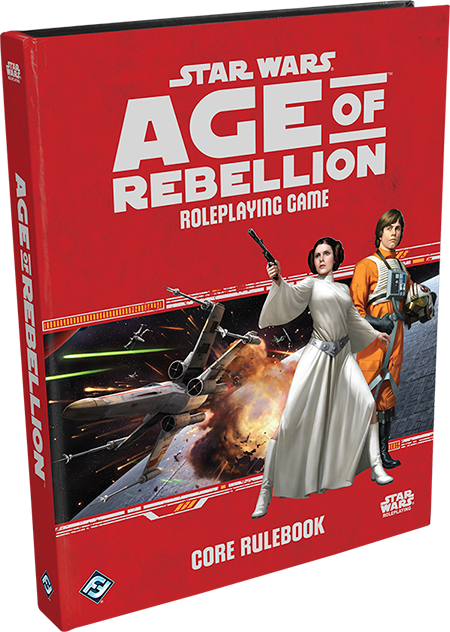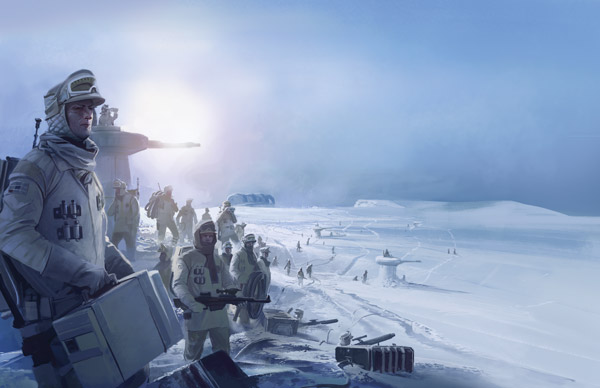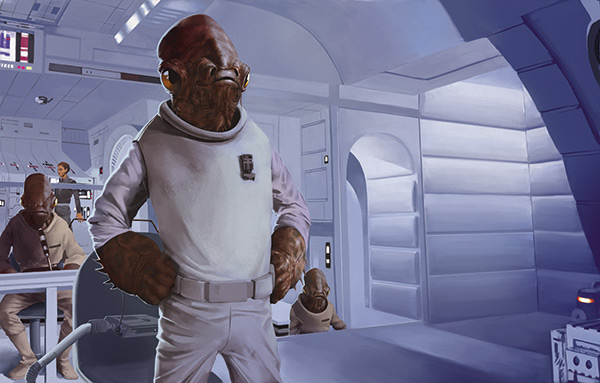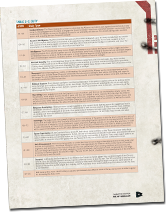
Your Duty to the Rebels
A Star Wars (R): Age of Rebellion (TM) Designer Diary

In February, we announced the Star Wars®: Age of Rebellion™ Core Rulebook. In Age of Rebellion, player characters join the Rebel Alliance, and wage a guerrilla war against the evil Galactic Empire. Each member of the Rebels has a different reason for joining the Alliance, and each will contribute to the cause in a different way.
Developer Andrew Fischer explores the concept and mechanics of Motivation and Duty in more detail in today’s designer diary.
What is Duty?
The Rebellion is a rag-tag group of freedom fighters, each of them there for their own reasons, and each of them contributing in their own unique way. As members of the Rebel Alliance, characters in Age of Rebellion represent these two aspects of their personalities with Motivations and Duties. Motivations represents why that character has chosen to join the Rebels, while Duties represent how they are helping the cause.
Character Duties are one of the core defining mechanics that shape the narrative experience in Age of Rebellion. They provide a structure around which players can grow their characters, and they give helpful guidance to GMs as they craft the ongoing campaign. Today I’m going to talk a bit about how we created Duty for the game, and go into how it can be used by both players and GMs to enhance the game experience.

The Process of Creating Duty
When we were creating our first Star Wars Roleplaying Game, Star Wars®: Edge of the Empire™, the Obligation mechanic became a defining part of the game experience. So, when we set out to create Age of Rebellion, we wanted to craft a mechanic that would act as a similar cornerstone that shaped the game experience. We bounced around many different ideas during this time, but we kept coming back to the concept of Duty: the unique way in which the character would help the Rebellion throughout the campaign.
For the actual mechanics of Duty, we wanted something that would feel familiar to players who had used Obligation in Edge of the Empire, but at the same time feel new and unique. Much like Obligation, each player’s Duty comprises two parts: a narrative component and a numerical component. The narrative component determines the nature of the character’s Duty. This is the description of the way in which the character helps the Rebellion in the fight against the Empire. The numeric value on the other hand, tracks how much the character has accomplished for the Rebellion with regards to their chosen narrative Duty. This value starts low when the character is first created, and increases over time as the character accomplished their objectives.
The last design challenge we faced in creating Duty was how to use these narrative and numerical components to motivate the players in their adventures, and how to reward them for their accomplishments. We decided that at a certain point, the PCs would have made such a meaningful contribution to the Rebellion, that they would be recognized in some meaningful way. Once a group’s total Duty value reaches a certain point, someone in the Rebel Alliance takes note of the PCs’ accomplishments and decides to reward them for their efforts. This could be by providing them with new equipment, a better ship, more authority within the Alliance structure, or any number of other resources or assets. Regardless of what tangible rewards the PCs choose to gain from their accomplishments, they are now more respected and powerful members of the Rebellion, and are treated as such. To represent entering this new “tier” of the organization, the numerical values of their Duties reset, and they must continue working to impress those above them, and to forward the Rebel cause as a whole.
Duty in Play
After many different refinements, and loads of playtesting and user feedback, we are very happy with the way Duty works in Age of Rebellion. It interacts with the other systems to enhance the game for both players and GMs. For players, it acts as a guiding light for roleplaying and character building, and for the GM it acts as a tool that can be used to build the campaign and bring specific characters into the spotlight.
When players start building their character for Age of Rebellion, one of the very first things they decide on is the character’s Duty. Defining this important concept first helps guide the player in the other decisions they have to make during character creation, weaving all of the different elements into a character that is interesting and exciting to play. Once in play, it helps shape how the character reacts to the galaxy around them, and how the character grows over the course of the campaign. By looking to both their Duty and Motivation, and coming up with creative ways for these two aspects of their character to interact, new and experienced players alike can create interesting and nuanced characters.

On the other side of the table, the GM can also use Duty to his advantage. First, each Duty gives a quick guide as to what the GM should include in his adventures to keep each character engaged. Simply by keeping track of the single-word name of the Duty of each of their players, a GM has an easy way to reference what that character’s goals in the game are. Second, Duty gives the GM a way to put a single character in the spotlight, highlighting that character’s accomplishments over the campaign. This is achieved by the GM performing a “Duty check,” rolling percentile dice and comparing the result to a chart made of the group’s Duty values. The character whose Duty is triggered in this way is emboldened by his recent successes, and may be rewarded in some way or featured in story of the session.
These simple ways that both players and GMs can use Duty have a powerful impact on the game. It is just one of the many elements that make the Age of Rebellion experience feel truly unique and impactful.
Duty Alongside Obligation
One of our main objectives when designing Age of Rebellion was to make sure that it stayed fully compatible with Edge of the Empire. One of the key parts of this was considering how Duty interacted with Obligation, and guaranteeing that the two mechanics work well alone, but also complement each other when used together. We designed and tested several different ways to use the mechanics together. In the end, because of the wide variety of possible groups that can be created using the two games in tandem, we ended up presenting several options that groups can choose between when putting together their campaign.
When creating a group of characters that draws from both Age of Rebellion and Edge of the Empire, the GM and players choose as a group how they want to use Duty and Obligation. There are four different options, each of which offers a different game experience:
- Obligation Only: All character in the group (both from Edge and Age) owe someone something. They each have an Obligation, and Duty isn’t used.
- Duty Only: All characters in the group have some commitment to the Rebel Alliance’s cause. They each have a Duty, and Obligation isn’t used.
- Both Obligation and Duty: All characters in the group are contributing to the Rebellion in some way, but they also have debts from other aspects of their life that they have to deal with. They each have both a Duty and and Obligation.
- Either Obligation or Duty: Each character in the group has their own unique commitments, some work for the Rebellion while others deal with their own business. They each choose either to use Duty or use Obligation.
 The Age of Rebellion Core Rulebook gives guidance on each of these options, including when to use them and what time of game experience each offers. These different options give groups full control over the type of experience they want to have in the Star Wars universe.
The Age of Rebellion Core Rulebook gives guidance on each of these options, including when to use them and what time of game experience each offers. These different options give groups full control over the type of experience they want to have in the Star Wars universe.
Thanks, Andrew!
Preview the Age of Rebellion Duty table by downloading it from our support page (PDF, 292 KB). Then, pre-order your copy of Age of Rebellion today, and keep checking back for more news and previews related to Star Wars roleplaying!
…
